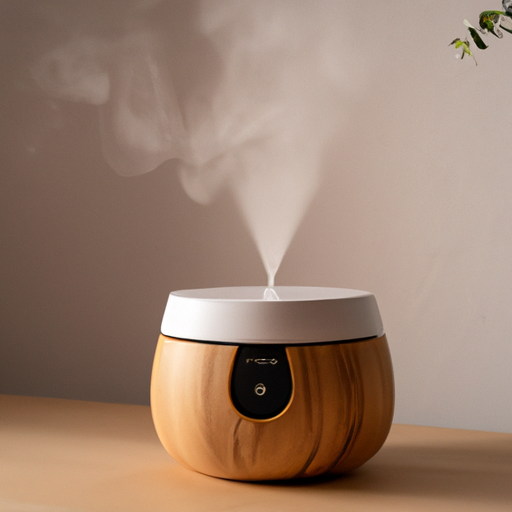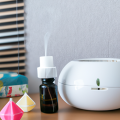-
Table of Contents
- Introduction
- What Are the Risks of Diffusing Too Much Essential Oil?
- How to Avoid Over-Diffusing Essential Oils
- What Are the Symptoms of Essential Oil Overdose?
- How to Safely Use Essential Oils in a Diffuser
- What Are the Benefits of Diffusing Essential Oils?
- How to Choose the Right Essential Oil for Your Diffuser
- What Are the Best Essential Oils for Diffusing?
- Q&A
- Conclusion
Introduction
Essential oils are a popular way to add a pleasant scent to a room, but it is important to be aware of the potential risks associated with using them. In particular, using too much essential oil in a diffuser can cause adverse health effects, such as headaches, nausea, and dizziness. In this article, we will discuss the potential risks of using too much essential oil in a diffuser and how to use essential oils safely.
What Are the Risks of Diffusing Too Much Essential Oil?
Diffusing essential oils can be a great way to enjoy the therapeutic benefits of aromatherapy. However, it is important to be aware of the potential risks of diffusing too much essential oil.
Excessive exposure to essential oils can cause skin irritation, headaches, nausea, and dizziness. In some cases, it can even lead to respiratory problems. Additionally, some essential oils can be toxic if ingested, so it is important to keep them away from children and pets.
It is also important to be aware of the potential for allergic reactions. Some people may be sensitive to certain essential oils, so it is important to test a small amount of the oil on the skin before diffusing it.
Finally, it is important to be aware of the potential for essential oils to interact with medications. Some essential oils can interact with certain medications, so it is important to consult with a doctor before diffusing essential oils if you are taking any medications.
In conclusion, diffusing essential oils can be a great way to enjoy the therapeutic benefits of aromatherapy. However, it is important to be aware of the potential risks of diffusing too much essential oil, including skin irritation, headaches, nausea, dizziness, respiratory problems, allergic reactions, and interactions with medications.
How to Avoid Over-Diffusing Essential Oils
Essential oils are a popular and natural way to improve your health and wellbeing. However, it is important to use them correctly to ensure that you get the most out of them. Over-diffusing essential oils can be dangerous and can lead to adverse reactions. Here are some tips to help you avoid over-diffusing essential oils.
1. Start with a small amount: When diffusing essential oils, it is important to start with a small amount. This will help you to gauge how your body reacts to the oil and will help you to determine the right amount for you.
2. Use the right diffuser: Different diffusers have different capacities and it is important to use the right one for the amount of oil you are using. If you are using a large amount of oil, you should use a larger diffuser.
3. Don’t diffuse for too long: Essential oils should not be diffused for more than 30 minutes at a time. This will help to ensure that you don’t over-diffuse the oil and that you get the most out of it.
4. Monitor your reactions: It is important to monitor your reactions to the essential oils. If you start to feel any adverse reactions, such as headaches or nausea, you should stop diffusing the oil immediately.
By following these tips, you can ensure that you get the most out of your essential oils without over-diffusing them. Essential oils can be a great way to improve your health and wellbeing, but it is important to use them correctly.
What Are the Symptoms of Essential Oil Overdose?
Essential oil overdose is a rare but serious condition that can occur when an individual is exposed to too much of an essential oil. Symptoms of essential oil overdose can vary depending on the type of oil and the amount of exposure, but may include nausea, vomiting, dizziness, headaches, confusion, and difficulty breathing. In severe cases, essential oil overdose can lead to seizures, coma, and even death.
It is important to note that essential oils are highly concentrated and should be used with caution. It is recommended to always dilute essential oils with a carrier oil before applying them to the skin or inhaling them. Additionally, it is important to be aware of any potential allergies or sensitivities to essential oils before using them.
If you experience any of the symptoms of essential oil overdose, it is important to seek medical attention immediately. Treatment for essential oil overdose may include supportive care, such as oxygen therapy, intravenous fluids, and medications to reduce nausea and vomiting. In severe cases, dialysis may be necessary to remove the essential oil from the body.
How to Safely Use Essential Oils in a Diffuser
Using essential oils in a diffuser is a great way to enjoy the therapeutic benefits of aromatherapy. However, it is important to use essential oils safely in order to avoid any potential risks. Here are some tips for safely using essential oils in a diffuser:
1. Read the instructions for your diffuser carefully. Make sure you understand how to use it properly and safely.
2. Start with a low concentration of essential oils. Begin with one or two drops of essential oil in the diffuser and increase the amount gradually.
3. Do not diffuse essential oils for more than 30 minutes at a time. This will help prevent any potential irritation to your eyes, nose, or throat.
4. Keep the diffuser away from children and pets. Essential oils can be toxic if ingested, so it is important to keep the diffuser out of reach of children and pets.
5. Clean the diffuser regularly. This will help prevent any build-up of essential oils, which can be harmful if inhaled.
6. Do not diffuse essential oils near an open flame. Essential oils are highly flammable and can be a fire hazard if used near an open flame.
By following these tips, you can safely enjoy the therapeutic benefits of essential oils in a diffuser.
What Are the Benefits of Diffusing Essential Oils?
Diffusing essential oils is a popular way to enjoy the therapeutic benefits of aromatherapy. Diffusing essential oils can help to reduce stress, improve mood, and promote relaxation. It can also help to purify the air, reduce odors, and provide a pleasant scent.
The most common way to diffuse essential oils is with an essential oil diffuser. This device uses ultrasonic waves to disperse the essential oils into the air. This allows the oils to be inhaled and absorbed into the body.
The benefits of diffusing essential oils include:
1. Stress relief: Diffusing essential oils can help to reduce stress and anxiety. Certain oils, such as lavender, have calming and soothing properties that can help to reduce stress and promote relaxation.
2. Improved mood: Diffusing essential oils can help to improve mood and reduce feelings of depression. Certain oils, such as bergamot and lemon, can help to uplift the mood and reduce feelings of sadness.
3. Improved sleep: Diffusing essential oils can help to improve sleep quality. Certain oils, such as lavender and chamomile, have calming and sedative properties that can help to promote restful sleep.
4. Air purification: Diffusing essential oils can help to purify the air and reduce odors. Certain oils, such as tea tree and eucalyptus, have antibacterial and antifungal properties that can help to reduce airborne bacteria and other contaminants.
5. Pleasant scent: Diffusing essential oils can provide a pleasant scent to any room. Certain oils, such as jasmine and rose, have a sweet and floral aroma that can help to create a calming and inviting atmosphere.
Overall, diffusing essential oils can provide a variety of therapeutic benefits. It can help to reduce stress, improve mood, and promote relaxation. It can also help to purify the air, reduce odors, and provide a pleasant scent.
How to Choose the Right Essential Oil for Your Diffuser
Essential oils are a great way to add a pleasant scent to your home, and diffusers are a great way to disperse the oils into the air. However, with so many different essential oils available, it can be difficult to know which one is right for your diffuser. Here are some tips to help you choose the right essential oil for your diffuser.
First, consider the size of your diffuser. If you have a small diffuser, you may want to choose a single essential oil or a blend of two or three oils. If you have a larger diffuser, you can use more oils in your blend.
Second, think about the type of scent you want. Do you want something calming and relaxing, or something energizing and invigorating? Different essential oils have different properties, so you can choose one that will create the atmosphere you want.
Third, consider the type of diffuser you have. Some diffusers are designed to work with specific essential oils, so make sure you choose an oil that is compatible with your diffuser.
Finally, think about the environment you want to create. Different essential oils can be used to create different moods, so choose an oil that will help you create the atmosphere you want.
By following these tips, you can easily choose the right essential oil for your diffuser. With the right oil, you can create a pleasant and inviting atmosphere in your home.
What Are the Best Essential Oils for Diffusing?
Essential oils are a popular choice for diffusing, as they can help to create a calming atmosphere and provide a range of therapeutic benefits. The best essential oils for diffusing depend on the desired effect. Some of the most popular essential oils for diffusing include lavender, eucalyptus, peppermint, lemon, and tea tree.
Lavender is a popular choice for diffusing, as it has a calming and relaxing effect. It can help to reduce stress and anxiety, and can also help to promote better sleep.
Eucalyptus is another popular essential oil for diffusing. It has a refreshing and invigorating scent, and can help to clear the airways and reduce congestion.
Peppermint is a great choice for diffusing, as it has a refreshing and energizing scent. It can help to improve focus and concentration, and can also help to reduce headaches.
Lemon is a great essential oil for diffusing, as it has a refreshing and uplifting scent. It can help to boost mood and energy levels, and can also help to reduce stress and anxiety.
Tea tree is a popular essential oil for diffusing, as it has a refreshing and cleansing scent. It can help to purify the air and reduce the spread of germs, and can also help to reduce inflammation.
Overall, the best essential oils for diffusing depend on the desired effect. Popular choices include lavender, eucalyptus, peppermint, lemon, and tea tree.
Q&A
1. Can too much essential oil in a diffuser make you sick?
Yes, too much essential oil in a diffuser can make you sick. Essential oils are highly concentrated and can cause irritation to the skin, eyes, and respiratory system when used in large amounts. It is important to follow the manufacturer’s instructions when using a diffuser and to not exceed the recommended amount of essential oil.
2. What are the symptoms of too much essential oil in a diffuser?
The symptoms of too much essential oil in a diffuser can include headaches, nausea, dizziness, and respiratory irritation.
3. How much essential oil should I use in my diffuser?
The amount of essential oil you should use in your diffuser depends on the size of the room and the type of diffuser you are using. Generally, it is recommended to use no more than 5-10 drops of essential oil per 100ml of water in a diffuser.
4. What should I do if I feel sick after using a diffuser?
If you feel sick after using a diffuser, stop using it immediately and open a window to allow fresh air to circulate. If your symptoms persist, seek medical attention.
5. Is it safe to use essential oils in a diffuser?
Yes, it is generally safe to use essential oils in a diffuser as long as you follow the manufacturer’s instructions and do not exceed the recommended amount of essential oil.
6. Can essential oils be harmful if used in a diffuser?
Yes, essential oils can be harmful if used in a diffuser in large amounts. Essential oils are highly concentrated and can cause irritation to the skin, eyes, and respiratory system when used in large amounts.
7. What should I do if I accidentally use too much essential oil in my diffuser?
If you accidentally use too much essential oil in your diffuser, stop using it immediately and open a window to allow fresh air to circulate. If your symptoms persist, seek medical attention.
Conclusion
In conclusion, it is possible for too much essential oil in a diffuser to make you sick. Essential oils are highly concentrated and can cause irritation to the skin, eyes, and respiratory system when used in large amounts. It is important to use essential oils in moderation and to follow the instructions provided by the manufacturer when using a diffuser.




